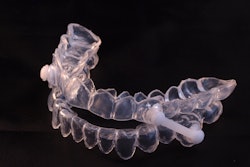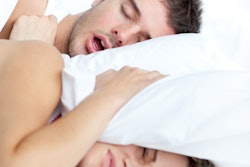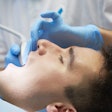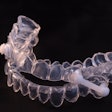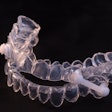Long-term mandibular advancement appliance (MAA) use may effectively reduce symptoms of obstructive sleep apnea (OSA). This study was recently published in the Journal of the American Dental Association.
Furthermore, MAA therapy may affect how OSA patients perceive their symptoms, such as decreased daytime sleepiness, the authors wrote.
"Understanding the factors influencing long-term adherence or nonadherence to OSA treatment with MAA is essential for sustaining the health and quality of life of the patients affected," wrote the authors, led by Dr. Clarissa Martensen Abruzzi, MS, of the University of Brasilia (JADA, April 5, 2025).
For this study, 121 adult patients who had undergone MAA therapy for OSA for over 10 years participated in a questionnaire-based survey. The survey assessed patients' perceived improvements in OSA symptoms and overall satisfaction with the treatment, they wrote.
Participants and their bed partners rated their satisfaction with MAA therapy while patients also evaluated improvements in daytime sleepiness, snoring, and sleep quality. Participants also provided reasons for starting therapy, such as partner disturbance from snoring, morning headaches, and daytime sleepiness.
The most common reason patients sought treatment was that their snoring was disturbing their bed partner (77.6%). Several factors were linked to long-term adherence to MAA therapy, including experiencing morning headaches prior to treatment (odds ratio [OR]: 32.11, 95% confidence interval [CI]: 2.52 to 404.13, p = .007), the belief that MAA therapy improved their sleep (OR: 6.58, 95% CI: 1.58 to 27.38, p = .01), and bed partner satisfaction with the therapy (OR: 4.12, 95% CI: 1.64 to 10.36, p = .003), they wrote.
There was a strong positive correlation between the number of hours MAA was used each night and improvements in both daytime sleepiness (p < .001, r = 0.681) and sleep quality (p < .001, r = 0.516). Additionally, better self-reported sleep quality was significantly associated with more nights of MAA use per week (p < .001, r = 0.439).
However, the study had limitations. Its reliance on self-reported questionnaires may have introduced recall bias, the authors noted.
"Results of long-term MAA therapy for OSA, with more than a decade of use, showed significant benefits in improving self-perception of OSA symptoms, reducing daytime sleepiness, and enhancing partner satisfaction," Abruzzi and co-authors Drs. Audrey Yoon, MS, and Jorge Faber, MS, PhD, concluded.





